英语句子种类与类型
高三英语语法句子种类与类型

1、陈述句 说明一个事实或陈述一个看法,有肯定式和否 定式,语序是主语在前,位于在后。
I
She arrived early.
She cannot have arrived now.
、 句
注:1)半否定句
子
I hardly know anything about it.
种 类
2)部分否定句与全否定句
I
2、疑问句 有一般疑问句、特殊疑问句、选择 疑问句、反义疑问句。
1)一般疑问句 用来询问一件事,答案通常是yes或 no,注意语序。
、 句
Have you anything to say?
子
种
Did someone phone me last night?
类
Can’t you understand it?
句
(2)倒装语序
子
种
Who are you talking about?
类
注:A、简略式 Why not go alone? Why get so angry? How/What about taking a rest?
B、复杂特殊疑问句
What do you think he has done?
3)选择疑问句
I
(1)以一般疑问句为基础
、
Is he a teacher or a doctor or a policeman?
句
子
Shall I help you or can you manage?
种
类
(2)以特殊疑问句为基础 Which do you prefer, red wine or white? How shall we go there? By bus or by train?
英语句子种类与类型
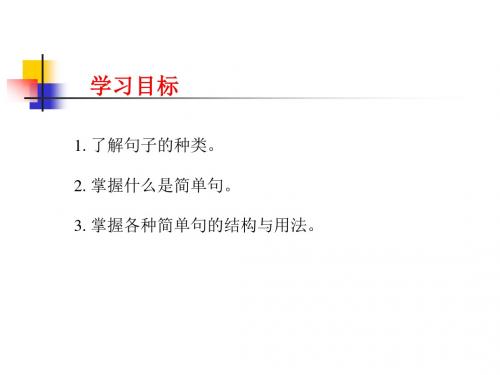
一般疑问句的改写 二改
1. 第一人称改成第二人称。即:I\we 改成you 2. 句中some 改为 any ; and 改为 or。
三问号 最后加“?”
Exercise 按要求改写句子
1. You can use this dictionary and that pen.(改为一般疑问句) Can you use this dictionary or that pen?
学习目标
1. 了解句子的种类。 2. 掌握什么是简单句。 3. 掌握各种简单句的结构与用法。
句子在结构上分为三类:
(一个主谓结构) 简单句 (and、but、so等) 并列句 (主句和从句) 复合句
1. I like apples.
2. We go to the same school
and we love soocer.
2. Her mother isn't a teacher.(改为肯定句) Her mother is a teacher.
3. He goes to school at seven in the morning.(改为否定句)
He doesn't go to school at seven in the morning.
3. 含有实义动词(have\like...)的一般疑问句,用助动词do或
does来回答。
Does he like English?
Yes, he does要看问句的主语 Exercise 易错题
1.
your name Black?
A. Are; it is B. Are; I am
Yes,
C.
C. Is; it is
D. Is; it isn't
英语句子种类

My deskmate often makes me laugh.
常见的可接不带to不定式当宾补的动词有: 一感二听三让五看” feel,/ hear, listen to, / let, make, have, /look at, see, , watch, notice, observe V + O + OC (V sb do sth)
英语句子基本成分示意图
宾语 宾语 宾补 宾语(间) 宾语(直) Vi(不及物动词)
表语
系动词
I like the golden eagle.
It has a hooked beak.
It looks strong.
It is lovely.
S
S
S
S
V
V
linking verbs(系动词)
for, so, therefore, thus
or, otherwise, either…or
练习:用适当的连词填空
1.August is the time of the year for harvesting , ________every day I work from dawn until dark. 2.He is a basketball fan,____ his wife is a volleyball fan. 3.Honey is sweet,_____ the bee stings. 4.Don’t be late, ______there is a meeting. 5.Hurry up, ____you’ll be late. 6.He works hard ______his brother is a lazy bone. 7.He was enjoying his KFC _____ a friend came.
高三英语语法句子种类与类型
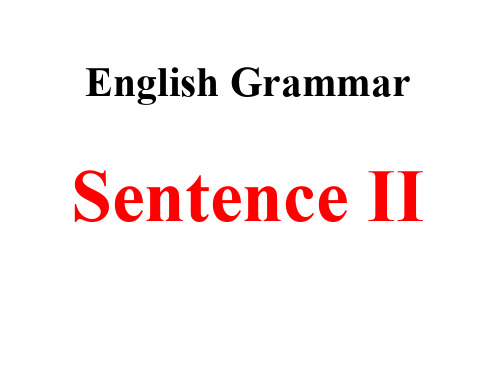
Sentence II
英语句子种类与类型
I、句子种类(按交际用途分) 陈述句、疑问句、祈使句、感叹句、 THERE-BE存在句
II、句子类型(按句子结构分) 简单句、并列句、复合句、并列复合句
提 纲
I、句子种类(按交际用途分)
陈述句、疑问句、祈使句、 感叹句、THERE-BE存在句
2、疑问句 有一般疑问句、特殊疑问句、选择
疑问句、反义疑问句。
1)一般疑问句 用来询问一件事,答案通常是yes或
I
no,注意语序。
、
Have you anything to say?
句
子
Did someone phone me last night?
种
类
Can’t you understand it?
Isn’t it a beautiful lake?
---Haven’t you been to the UK?
---No, I haven’t.
2)特殊疑问句 疑问词有
who,whose,what,which,where,when,why,how等。
(1)陈述语序
I
Who was the first man in space?
、
(2)倒装语序
Hale Waihona Puke 句 子Who are you talking about?
种
类
注:A、简略式
Why not go alone? Why get so angry?
I like neither Cathy nor Mary.
3)否定转移
I don’t think it will be very cold today.
句子的种类英语基础语法汇总
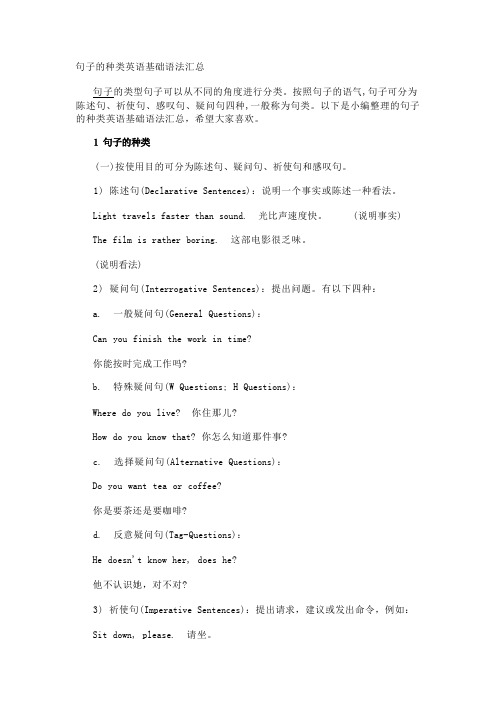
句子的种类英语基础语法汇总句子的类型句子可以从不同的角度进行分类。
按照句子的语气,句子可分为陈述句、祈使句、感叹句、疑问句四种,一般称为句类。
以下是小编整理的句子的种类英语基础语法汇总,希望大家喜欢。
(一)按使用目的可分为陈述句、疑问句、祈使句和感叹句。
1) 陈述句(Declarative Sentences):说明一个事实或陈述一种看法。
Light travels faster than sound. 光比声速度快。
(说明事实)The film is rather boring. 这部电影很乏味。
(说明看法)2) 疑问句(Interrogative Sentences):提出问题。
有以下四种:a. 一般疑问句(General Questions):Can you finish the work in time?你能按时完成工作吗?b. 特殊疑问句(W Questions; H Questions):Where do you live? 你住那儿?How do you know that? 你怎么知道那件事?c. 选择疑问句(Alternative Questions):Do you want tea or coffee?你是要茶还是要咖啡?d. 反意疑问句(Tag-Questions):He doesn't know her, does he?他不认识她,对不对?3) 祈使句(Imperative Sentences):提出请求,建议或发出命令,例如:Sit down, please. 请坐。
Don't be nervous! 别紧张!4) 感叹句(Exclamatory Sentences):表示说话人惊奇、喜悦、愤怒等情绪,例如:What good news it is! 多好的消息啊!(二)句子按其结构可以分为以下三类:1) 简单句(Simple Sentences):只包含一个主谓结构句子叫简单句,例如:She is fond of collecting stamps. 她喜欢集邮。
高考英语语法句子类型及句子成分基础知识
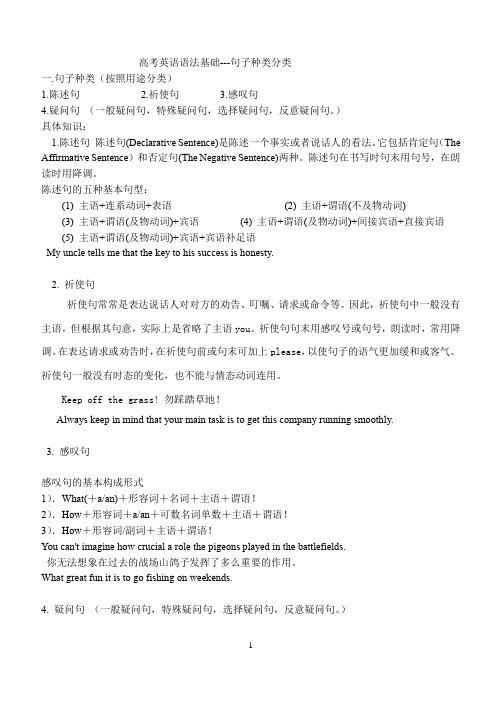
高考英语语法基础---句子种类分类一.句子种类(按照用途分类)1.陈述句2.祈使句3.感叹句4.疑问句(一般疑问句,特殊疑问句,选择疑问句,反意疑问句。
)具体知识:1.陈述句陈述句(Declarative Sentence)是陈述一个事实或者说话人的看法。
它包括肯定句(The Affirmative Sentence)和否定句(The Negative Sentence)两种。
陈述句在书写时句末用句号,在朗读时用降调。
陈述句的五种基本句型:(1) 主语+连系动词+表语(2) 主语+谓语(不及物动词)(3) 主语+谓语(及物动词)+宾语(4) 主语+谓语(及物动词)+间接宾语+直接宾语(5) 主语+谓语(及物动词)+宾语+宾语补足语My uncle tells me that the key to his success is honesty.2. 祈使句祈使句常常是表达说话人对对方的劝告、叮嘱、请求或命令等。
因此,祈使句中一般没有主语,但根据其句意,实际上是省略了主语you。
祈使句句末用感叹号或句号,朗读时,常用降调。
在表达请求或劝告时,在祈使句前或句末可加上please,以使句子的语气更加缓和或客气。
祈使句一般没有时态的变化,也不能与情态动词连用。
Keep off the grass! 勿踩踏草地!Always keep in mind that your main task is to get this company running smoothly.3. 感叹句感叹句的基本构成形式1).What(+a/an)+形容词+名词+主语+谓语!2).How+形容词+a/an+可数名词单数+主语+谓语!3).How+形容词/副词+主语+谓语!You can't imagine how crucial a role the pigeons played in the battlefields.你无法想象在过去的战场山鸽子发挥了多么重要的作用。
高考英语语法句子类型及句子成分基础知识点
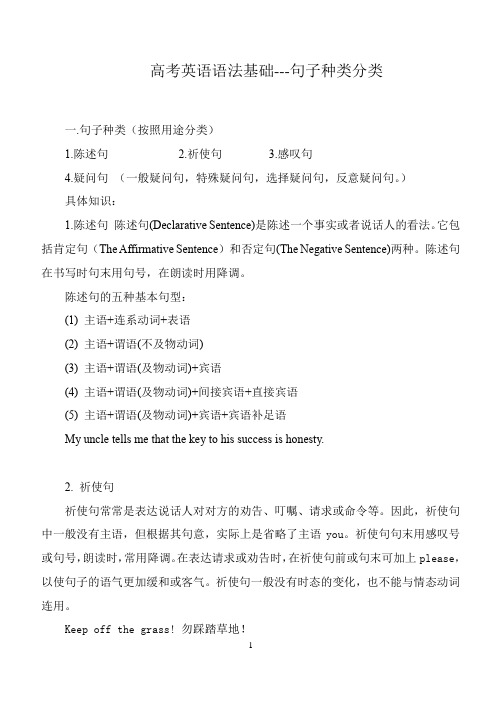
高考英语语法基础---句子种类分类一.句子种类(按照用途分类)1.陈述句2.祈使句3.感叹句4.疑问句(一般疑问句,特殊疑问句,选择疑问句,反意疑问句。
)具体知识:1.陈述句陈述句(Declarative Sentence)是陈述一个事实或者说话人的看法。
它包括肯定句(The Affirmative Sentence)和否定句(The Negative Sentence)两种。
陈述句在书写时句末用句号,在朗读时用降调。
陈述句的五种基本句型:(1) 主语+连系动词+表语(2) 主语+谓语(不及物动词)(3) 主语+谓语(及物动词)+宾语(4) 主语+谓语(及物动词)+间接宾语+直接宾语(5) 主语+谓语(及物动词)+宾语+宾语补足语My uncle tells me that the key to his success is honesty.2. 祈使句祈使句常常是表达说话人对对方的劝告、叮嘱、请求或命令等。
因此,祈使句中一般没有主语,但根据其句意,实际上是省略了主语you。
祈使句句末用感叹号或句号,朗读时,常用降调。
在表达请求或劝告时,在祈使句前或句末可加上please,以使句子的语气更加缓和或客气。
祈使句一般没有时态的变化,也不能与情态动词连用。
Keep off the grass! 勿踩踏草地!Always keep in mind that your main task is to get this company running smoothly.3. 感叹句感叹句的基本构成形式1).What(+a/an)+形容词+名词+主语+谓语!2).How+形容词+a/an+可数名词单数+主语+谓语!3).How+形容词/副词+主语+谓语!You can't imagine how crucial a role the pigeons played in the battlefields.你无法想象在过去的战场山鸽子发挥了多么重要的作用。
英语句子种类与类型
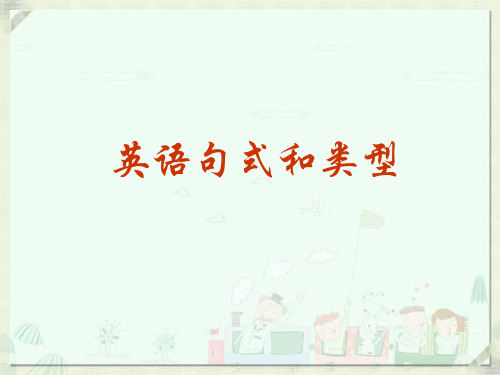
How shall we go there? By bus or by train?
4)反义疑问句
问:+,-?或-,+?
答:+,+. 或-,-.
1.Tom hardly knows French, ______ ______?
2.—Mary didn't fail her exam, did she?
宾语
主 语
简单句基本句型实例
主语 + 不及物动词 She came./ My head aches. 主语 + 及物动词 + 宾语 She likes English. 主语 + 系动词 + 主语补语(表语) She is happy. 主语 + 双宾动词 + 间接宾语 + 直接宾语 She gave John a book. She bought a book for me. 主语 + 宾补动词 + 宾语 + 宾语补语 She makes her mother angry. The teacher asked me to read the passage. There +be There is a book on the desk.
---______, she didn‘t.
3.You needn’t come, ______ you?
You need to come, ______ you? 4.He had a big time there, ______ he? He had a car, ______ he? We hardly have to get up early, ______ we?
5.He used to live in Leeds, ______ he?
4)反义疑问句
- 1、下载文档前请自行甄别文档内容的完整性,平台不提供额外的编辑、内容补充、找答案等附加服务。
- 2、"仅部分预览"的文档,不可在线预览部分如存在完整性等问题,可反馈申请退款(可完整预览的文档不适用该条件!)。
- 3、如文档侵犯您的权益,请联系客服反馈,我们会尽快为您处理(人工客服工作时间:9:00-18:30)。
2、疑问句
一般疑问句、特殊疑问句、选择疑问句
1)一般疑问句
是疑问句的一种。 它是以be 动词、情态动词、助动词开头,用yes或no 来回答的句子。
一般疑问句的改写
一调,二改,三问号
一般疑问句的改写
They are in the classroom.
一调
1. 含有be动词的一般疑问句,通常是把be动词调到句首。
一般疑问句的回答
1. 含有be动词的一般疑问句,用be动词来回答。
Is Mary your sister?
Yes, she is?
No, she isn't.
2. 含有情态动词(can\must...)的一般疑问句,用情态动词来 回答。 Yes, you can? No, you can't. Can I come in? 3. 含有实义动词(have\like...)的一般疑问句,用助动词do或 does来回答。 Does he like English? Yes, he does? No, he doesn't.
肯定句
变
否定句
2. 观察句子中有没有情态动词(can\must等). 如果有,在情态动词后面加not. ① I can play soccer. I can not play soccer.
肯定句
变
否定句
3. 观察句子中有没有实义动词. 如果有,在实义动词的基础上提取助动词don't或doesn't, 实义动词变原形. ① I like music. I don't like music. ② He likes music. He doesn't like music.
宾语从句
A. 并列句 B. 简单句 C. 复合句
Simple Sentences
简单句
I、简单句(按交际用途分)
陈述句、疑问句、祈使句、 感叹句、there be存在句
1、陈述句 说明一个事实或陈述一个看法。
肯定句和否定句。
肯定句如何变为否定句?
肯定句
变
否定句
1. 先观察句子中有没有be (am\ is \ are) 动词. 如果有,在be动词后面加not. ① Tom and Jim are friends. Tom and Jim are not friends.
祈使句的否定
① 一般来说,在句首加Don't
② 当祈使句表示邀请或建议(Let’s…) 时,则在Let’s 与 do之间加not。 1. Let's get it. Let's not get it. Don't spell it. Don't come and show us.
2. Spell it.
3. Come and show us.
4、 THERE-BE存在句
一、there be 句型 1、 定义:There be句型表示某处存在某物或某人。 2、结构: (1) There is +单数可数名词/不可数名词+ 地点状语. (2) There are +复数名词+地点状语.
注意:there be 句型的
答语的主语要看问句的主语
Exercise 易错题
1. your name Black? A. Are; it is B. Are; I am 2. Is this your ruler? No, A. it is B. this isn't C Yes, C. Is; it is . D. Is; it isn't
D. those aren't.
. C. Yes, she is.
D. Yes, he is.
2)特殊疑问句
是疑问句的一种。 它是特殊疑问who,whose,what,which,where,when,why,how 等开头的句子。
特殊疑问句的结构
(1)对主语或主语的修饰语提问,用特殊疑问词代替 提问内容。 对主语提问 The apple is on the table. My books are on the table. 对主语的修饰语提问 (2)对其他部分提问: 特殊疑问词+一般疑问句 The apple is on the table. Where is the apple? What is on the table? Whose books are on the table?
D . It's hers. C. this is D. it isn't
A 3. Are those Tom and Jim? Yes, . A. they are B. those are C. they aren't A 4. Are you Helen? A. Yes, I am. B. Yes, you are.
肯定句如何变为否Leabharlann 句?1. be 2. 情态动词
3. 实义动词
4. some 和 and
Exercise
按要求改写句子
1. You can use this dictionary and that pen.(改为否定句) You can't use this dictionary or that pen. 2. Her mother isn't a teacher.(改为肯定句) Her mother is a teacher. 3. He goes to school at seven in the morning.(改为否定句) He doesn't go to school at seven in the morning.
(2)以特殊疑问句为基础
What color do you like, red or white? I like red. 或 I like white. Red. 或 White.
3、祈使句
表达命令、要求、请求、劝告等,用原形开头。 1. Let me get it. 2. Spell it. 3. Come and show us.
Are they in the classroom?
2. 含有情态动词(can\must...)的一般疑问句,把情态动词调 到句首。 He can play football. Can he play football? 3. 含有实义动词(have\like...)的一般疑问句,提取助动词调 到句首,实义动词用原形。 Amy speaks English. Does Amy speak English?
一般疑问句的改写
二改
1. 第一人称改成第二人称。即:I\we 改成you 2. 句中some 改为 any ; and 改为 or。
三问号
最后加“?”
Exercise
按要求改写句子
1. You can use this dictionary and that pen.(改为一般疑问句) Can you use this dictionary or that pen? 2. Her mother is a teacher.(改为一般疑问句) Is her mother a teacher. 3. He goes to school at seven in the morning.(改为一般疑问句) Does he go to school at seven in the morning.
English Grammar
Sentences
句子
学习目标
1. 了解句子的种类。 2. 掌握什么是简单句。 3. 掌握各种简单句的结构与用法。
句子在结构上分为三类:
简单句 (and、but、so等) 并列句 (主句和从句) 复合句
(一个主谓结构)
1. I like apples. 2. We go to the same school and we love soocer. 3. The teacher says it is useful.
My books are on the table.
Where are your books?
回答不能用yes 或no,而应根据实际情况回答,可以 用完整句子来回答,也可根据选项部分用一个短语来回答。
3)选择疑问句
(1)以一般疑问句为基础 Can you sing or dance? I can sing. 或 I can dance. Sing. 或 Dance.
就近原则
当主语是两个或两个以上的名词时,谓语动词要与跟
它最近的那个名词一致。
如:① There is a bird in the tree. 树上有一只鸟。 ② There is a teacher and many students in our classroom. 我们教室里有一位老师和许多学生。 ③ There are two boys and a girl under the tree. 树下有两个男孩,一个女孩。
肯定句
变
否定句
4. 如果句子中有some, 要改为any. 如果句子中有and, 要改为or. ① I can sing and dance. I can not sing or dance. ② He has some interesting stories. He doesn't have any interesting stories.
